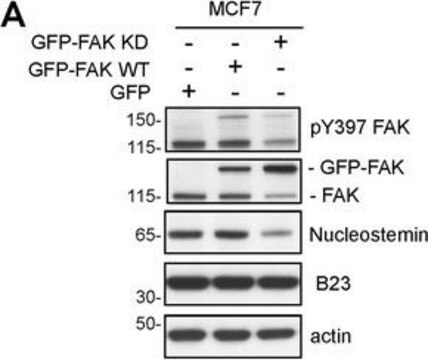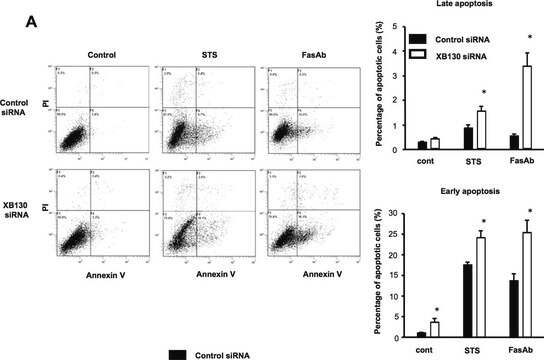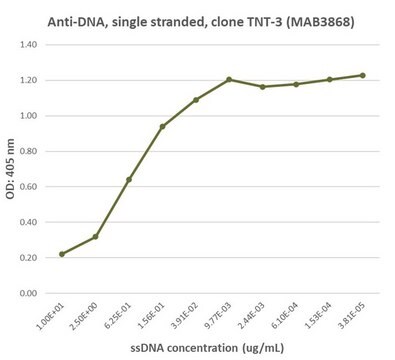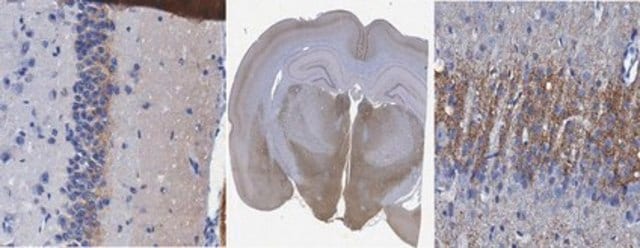おすすめの製品
由来生物
mouse
抗体製品の状態
culture supernatant
抗体製品タイプ
primary antibodies
クローン
rJ2, monoclonal
交差性
virus
包装
antibody small pack of 25 μL
テクニック
immunocytochemistry: suitable
immunofluorescence: suitable
アイソタイプ
IgG2aκ
ターゲットの翻訳後修飾
unmodified
詳細
Double-stranded RNA (dsRNA) is a viral product that induces innate immunity, leading to the production of interferon (IFN) alpha and beta, which can lead to the activation of hundreds of IFN-stimulated genes that confer resistance to viruses. dsRNA of more than 30-bp length are reported to be is a key activator of the innate immune response against viral infections. dsRNA is produced by positive-strand RNA viruses, dsRNA viruses, and DNA viruses. However, negative-strand RNA viruses are not shown to generate any significant dsRNA signals. The interaction of the host cell with dsRNA can occur in several ways. Mainly, specific receptors activate the synthesis of IFN alpha and beta, antiviral proteins, and dsRNA-activated enzymes that can block viral replication. dsRNA replication is shown to occur in the cytoplasm for all dsRNA viruses. This dsRNA-specific mouse monoclonal antibody specifically recognizes dsRNA of more than 40-bp length. Clone rJ2 has been used to detect dsRNA intermediates of multiple types of viruses, including Hepatitis C virus, Dengue virus, rhinovirus, Chikungunya virus, Rabies virus, and Polio virus in biological samples. It can be useful in understanding how anti-viral responses are initiated and what how viruses overcome and avoid these antiviral therapies.
特異性
Clone rJ2 specifically recognizes double stranded RNA (dsRNA) of greater than 40 bp in length that is generated during the replication of positive sense genome viruses.
免疫原
Double stranded RNA produced by positive sense genome viruses.
アプリケーション
Research Category
炎症及び免疫
炎症及び免疫
Anti-dsRNA, clone rJ2, Cat. No. MABE1134, is a mouse monoclonal antibody that detects double stranded RNA (dsRNA) and has been tested for use in Immunocytochemistry and Immunofluorescence.
Immunofluorescence Analysis: A representative lot detected dsRNA in Immunofluorescent applications (Savidis, G., et. al. (2016). Cell Rep. 15(11):2323-30; Savidis, G., et. al. (2016). Cell Rep. 16(1):232-246).
品質
Evaluated by Immunocytochemistry in Dengue virus infected A549 cells.
Immunocytochemistry Analysis: A 1:60 dilution of this antibody detected dsRNA in Dengue virus infected A549 cells.
Immunocytochemistry Analysis: A 1:60 dilution of this antibody detected dsRNA in Dengue virus infected A549 cells.
物理的形状
Unpurified
Mouse monoclonal antibody in supernatant without preservatives.
保管および安定性
Stable for 1 year at -20°C from date of receipt. Handling Recommendations: Upon receipt and prior to removing the cap, centrifuge the vial and gently mix the solution. Aliquot into microcentrifuge tubes and store at -20°C. Avoid repeated freeze/thaw cycles, which may damage IgG and affect product performance.
その他情報
Concentration: Please refer to lot specific datasheet.
免責事項
Unless otherwise stated in our catalog or other company documentation accompanying the product(s), our products are intended for research use only and are not to be used for any other purpose, which includes but is not limited to, unauthorized commercial uses, in vitro diagnostic uses, ex vivo or in vivo therapeutic uses or any type of consumption or application to humans or animals.
適切な製品が見つかりませんか。
製品選択ツール.をお試しください
保管分類コード
10 - Combustible liquids
WGK
WGK 3
適用法令
試験研究用途を考慮した関連法令を主に挙げております。化学物質以外については、一部の情報のみ提供しています。 製品を安全かつ合法的に使用することは、使用者の義務です。最新情報により修正される場合があります。WEBの反映には時間を要することがあるため、適宜SDSをご参照ください。
Jan Code
MABE1134-25UL:
MABE1134-100UL:
試験成績書(COA)
製品のロット番号・バッチ番号を入力して、試験成績書(COA) を検索できます。ロット番号・バッチ番号は、製品ラベルに「Lot」または「Batch」に続いて記載されています。
Kim M Stegmann et al.
iScience, 25(5), 104293-104293 (2022-05-03)
The nucleoside analog N4-hydroxycytidine (NHC) is the active metabolite of the prodrug molnupiravir, which has been approved for the treatment of COVID-19. SARS-CoV-2 incorporates NHC into its RNA, resulting in defective virus genomes. Likewise, inhibitors of dihydroorotate dehydrogenase (DHODH) reduce
Jules B Weinstein et al.
iScience, 25(3), 103960-103960 (2022-03-01)
The spike glycoprotein of SARS-CoV-2 engages with human ACE 2 to facilitate infection. Here, we describe an alpaca-derived heavy chain antibody fragment (VHH), saRBD-1, that disrupts this interaction by competitively binding to the spike protein receptor-binding domain. We further generated
Scotland E Farley et al.
Nature communications, 13(1), 3487-3487 (2022-06-18)
A comprehensive understanding of host dependency factors for SARS-CoV-2 remains elusive. Here, we map alterations in host lipids following SARS-CoV-2 infection using nontargeted lipidomics. We find that SARS-CoV-2 rewires host lipid metabolism, significantly altering hundreds of lipid species to effectively
Esen Sefik et al.
Nature, 606(7914), 585-593 (2022-04-29)
Severe COVID-19 is characterized by persistent lung inflammation, inflammatory cytokine production, viral RNA and a sustained interferon (IFN) response, all of which are recapitulated and required for pathology in the SARS-CoV-2-infected MISTRG6-hACE2 humanized mouse model of COVID-19, which has a human
Tomer M Yaron et al.
bioRxiv : the preprint server for biology (2020-08-21)
While vaccines are vital for preventing COVID-19 infections, it is critical to develop new therapies to treat patients who become infected. Pharmacological targeting of a host factor required for viral replication can suppress viral spread with a low probability of
ライフサイエンス、有機合成、材料科学、クロマトグラフィー、分析など、あらゆる分野の研究に経験のあるメンバーがおります。.
製品に関するお問い合わせはこちら(テクニカルサービス)








